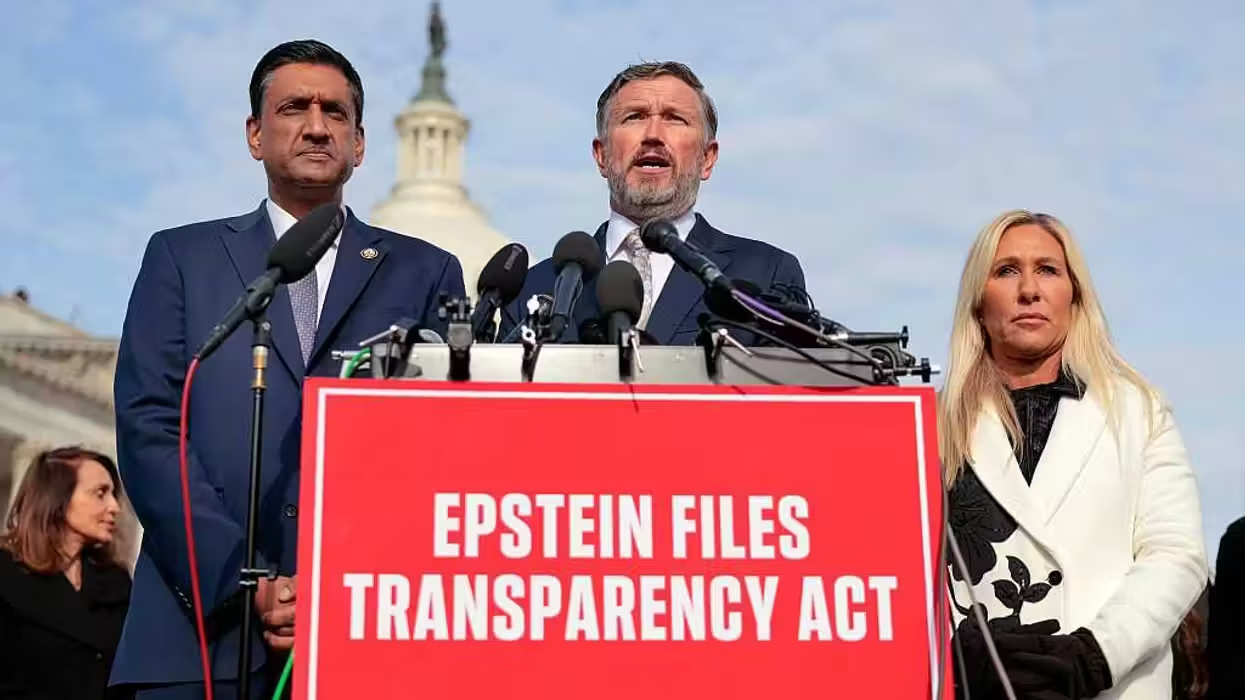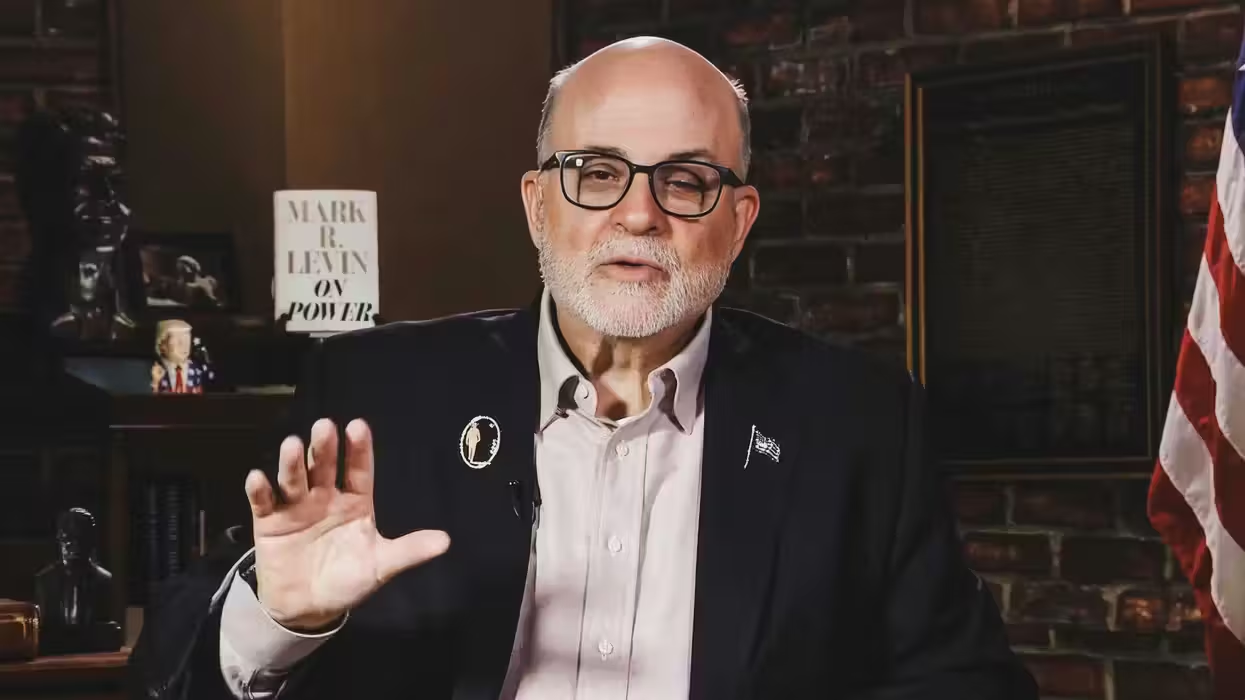
© 2025 Blaze Media LLC. All rights reserved.
#TBT: 37 definitions from the one dictionary you'll actually want to read
February 20, 2014
'Bitter' Bierce's 'The Devil's Dictionary.'
The following quotes come from Ambrose "Bitter" Bierce's, "The Devil's Dictionary."
Bierce was one of the wittiest (and at times harshest) satirists of his day, and his work which has a libertarian bent to it is still relevant today.

1. ARISTOCRACY, n. Government by the best men. (In this sense the word is obsolete; so is that kind of government.) Fellows that wear downy hats and clean shirts—guilty of education and suspected of bank accounts.
2. ECONOMY, n. Purchasing the barrel of whiskey that you do not need for the price of the cow that you cannot afford.
3. EDUCATION, n. That which discloses to the wise and disguises from the foolish their lack of understanding.
4. FUTURE, n. That period of time in which our affairs prosper, our friends are true and our happiness is assured.
5. HISTORY, n. An account mostly false, of events mostly unimportant, which are brought about by rulers mostly knaves, and soldiers mostly fools.
Of Roman history, great Niebuhr's shown'Tis nine-tenths lying. Faith, I wish 'twere known,
Ere we accept great Niebuhr as a guide,
Wherein he blundered and how much he lied. -- Salder Bupp
6. HYPOCRITE, n. One who, professing virtues that he does not respect secures the advantage of seeming to be what he depises.
7. IDIOT, n. A member of a large and powerful tribe whose influence in human affairs has always been dominant and controlling. The Idiot's activity is not confined to any special field of thought or action, but "pervades and regulates the whole." He has the last word in everything; his decision is unappealable. He sets the fashions and opinion of taste, dictates the limitations of speech and circumscribes conduct with a dead-line.
8. INFLUENCE, n. In politics, a visionary quo given in exchange for a substantial quid.
9. INJUSTICE, n. A burden which of all those that we load upon others and carry ourselves is lightest in the hands and heaviest upon the back.
10. LAWYER, n. One skilled in circumvention of the law.
11. LIBERTY, n. One of Imagination's most precious possessions.
The rising People, hot and out of breath,Roared around the palace: "Liberty or death!"
"If death will do," the King said, "let me reign;
You'll have, I'm sure, no reason to complain." -- Martha Braymance
12. LITIGATION, n. A machine which you go into as a pig and come out of as a sausage.
13. MINISTER, n. An agent of a higher power with a lower responsibility. In diplomacy and officer sent into a foreign country as the visible embodiment of his sovereign's hostility. His principal qualification is a degree of plausible inveracity next below that of an ambassador.
14. MISFORTUNE, n. The kind of fortune that never misses.
15. MONARCH, n. A person engaged in reigning. Formerly the monarch ruled, as the derivation of the word attests, and as many subjects have had occasion to learn. In Russia and the Orient the monarch has still a considerable influence in public affairs and in the disposition of the human head, but in western Europe political administration is mostly entrusted to his ministers, he being somewhat preoccupied with reflections relating to the status of his own head.
16. MULTITUDE, n. A crowd; the source of political wisdom and virtue. In a republic, the object of the statesman's adoration. "In a multitude of consellors there is wisdom," saith the proverb. If many men of equal individual wisdom are wiser than any one of them, it must be that they acquire the excess of wisdom by the mere act of getting together. Whence comes it? Obviously from nowhere—as well say that a range of mountains is higher than the single mountains composing it. A multitude is as wise as its wisest member if it obey him; if not, it is no wiser than its most foolish.
17. NOMINEE, n. A modest gentleman shrinking from the distinction of private life and diligently seeking the honorable obscurity of public office.
18. OPPOSITION, n. In politics the party that prevents the Government from running amuck by hamstringing it.
The King of Ghargaroo, who had been abroad to study the science of government, appointed one hundred of his fattest subjects as members of a parliament to make laws for the collection of revenue. Forty of these he named the Party of Opposition and had his Prime Minister carefully instruct them in their duty of opposing every royal measure. Nevertheless, the first one that was submitted passed unanimously. Greatly displeased, the King vetoed it, informing the Opposition that if they did that again they would pay for their obstinacy with their heads. The entire forty promptly disemboweled themselves.
"What shall we do now?" the King asked. "Liberal institutions cannot be maintained without a party of Opposition."
"Splendor of the universe," replied the Prime Minister, "it is true these dogs of darkness have no longer their credentials, but all is not lost. Leave the matter to this worm of the dust."
So the Minister had the bodies of his Majesty's Opposition embalmed and stuffed with straw, put back into the seats of power and nailed there. Forty votes were recorded against every bill and the nation prospered. But one day a bill imposing a tax on warts was defeated—the members of the Government party had not been nailed to their seats! This so enraged the King that the Prime Minister was put to death, the parliament was dissolved with a battery of artillery, and government of the people, by the people, for the people perished from Ghargaroo.
19. PARDON, v. To remit a penalty and restore to the life of crime. To add to the lure of crime the temptation of ingratitude.
20. PEACE, n. In international affairs, a period of cheating between two periods of fighting.
O, what's the loud uproar assailingMine ears without cease?
'Tis the voice of the hopeful, all-hailing
The horrors of peace.
Ah, Peace Universal; they woo it—
Would marry it, too.
If only they knew how to do it
'Twere easy to do.
They're working by night and by day
On their problem, like moles.
Have mercy, O Heaven, I pray,
On their meddlesome souls! -- Ro Amil
21. PHILANTHROPIST, n. A rich (and usually bald) old gentleman who has trained himself to grin while his conscience is picking his pocket.
22. PLAGIARIZE, v. To take the thought or style of another writer whom one has never, never read.
23. PLAN, v.t. To bother about the best method of accomplishing an accidental result.
24. POLITICS, n. A strife of interests masquerading as a contest of principles. The conduct of public affairs for private advantage.
25. POVERTY, n. A file provided for the teeth of the rats of reform. The number of plans for its abolition equals that of the reformers who suffer from it, plus that of the philosophers who know nothing about it. Its victims are distinguished by possession of all the virtues and by their faith in leaders seeking to conduct them into a prosperity where they believe these to be unknown.
26. PRECEDENT, n. In Law, a previous decision, rule or practice which, in the absence of a definite statute, has whatever force and authority a Judge may choose to give it, thereby greatly simplifying his task of doing as he pleases. As there are precedents for everything, he has only to ignore those that make against his interest and accentuate those in the line of his desire. Invention of the precedent elevates the trial-at-law from the low estate of a fortuitous ordeal to the noble attitude of a dirigible arbitrament.
27. PRESIDENCY, n. The greased pig in the field game of American politics.
28. PRESIDENT, n. The leading figure in a small group of men of whom—and of whom only—it is positively known that immense numbers of their countrymen did not want any of them for President.
If that's an honor surely 'tis a greaterTo have been a simple and undamned spectator.
Behold in me a man of mark and note
Whom no elector e'er denied a vote!—
An undiscredited, unhooted gent
Who might, for all we know, be President
By acclimation. Cheer, ye varlets, cheer—
I'm passing with a wide and open ear! -- Jonathan Fomry
29. PROPHECY, n. The art and practice of selling one's credibility for future delivery.
30. PUSH, n. One of the two things mainly conducive to success, especially in politics. The other is Pull.
31. RADICALISM, n. The conservatism of to-morrow injected into the affairs of to-day.
32. REFORM, v. A thing that mostly satisfies reformers opposed to reformation.
33. REPRESENTATIVE, n. In national politics, a member of the Lower House in this world, and without discernible hope of promotion in the next.
34. RICHES, n.
A gift from Heaven signifying, "This is my beloved son, in whom I am well pleased."—John D. Rockefeller
The reward of toil and virtue.—J.P. Morgan
The sayings of many in the hands of one.—Eugene Debs
To these excellent definitions the inspired lexicographer feels that he can add nothing of value.
35. SENATE, n. A body of elderly gentlemen charged with high duties and misdemeanors.
36. TRUTH, n. An ingenious compound of desirability and appearance. Discovery of truth is the sole purpose of philosophy, which is the most ancient occupation of the human mind and has a fair prospect of existing with increasing activity to the end of time.
37. VOTE, n. The instrument and symbol of a freeman's power to make a fool of himself and a wreck of his country.
Want to leave a tip?
We answer to you. Help keep our content free of advertisers and big tech censorship by leaving a tip today.
Want to join the conversation?
Already a subscriber?
Ben Weingarten is a writer, commentator, and editor at large at RealClearInvestigations. He is a senior contributor at the Federalist and writes columns for Newsweek and the Epoch Times.
Ben Weingarten
Ben Weingarten is a writer, commentator, and editor at large at RealClearInvestigations. He is a senior contributor at the Federalist and writes columns for Newsweek and the Epoch Times.
more stories
Sign up for the Blaze newsletter
By signing up, you agree to our Privacy Policy and Terms of Use, and agree to receive content that may sometimes include advertisements. You may opt out at any time.
Related Content
© 2025 Blaze Media LLC. All rights reserved.
Get the stories that matter most delivered directly to your inbox.
By signing up, you agree to our Privacy Policy and Terms of Use, and agree to receive content that may sometimes include advertisements. You may opt out at any time.






